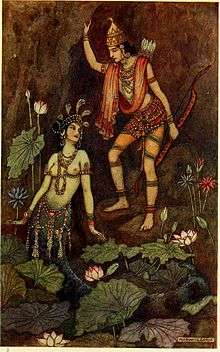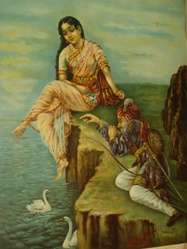Ulupi
Ulupi (also known as Uloopi), is a character in the Hindu epic Mahabharata. The daughter of Kauravya, the king of Nāgas, she was among the four wives of Arjuna. She also finds a mention in the Vishnu Purana and the Bhagavata Purana.
| Ulūpī | |
|---|---|
| Mahabharata character | |
 Arjuna meets Ulupi | |
| In-universe information | |
| Affiliation | Nāga |
| Family | Kauravya (father), Vishvahini (mother), |
| Spouse | Arjuna |
| Children | Irāvān |
| Relatives | Kunti (mother-in-law), Pandavas (brothers-in-law), Draupadi, Chitrāngadā, Subhadra (co-wives) |
Ulupi is said to have met and married Arjuna when he was in exile, and with whom she bore his son Irāvān. She played a major part in the upbringing of Babruvāhana, Arjuna's son with Chitrāngadā. She is also credited with redeeming Arjuna from the curse of the Vasus by restoring his life after he was slain in a battle by Babruvāhana.
Etymology and form
Little is said about Ulupi in the Mahabharata. Ulupi is known by numerous names in the Mahabharata—Bhujagātmajā, Bhujagendrakanyakā, Bhujagottamā Kauravī, Kauravyaduhitā, Kauravyakulanandinī, Pannaganandinī, Pannagasutā, Pannagātmajā, Pannageśvarakanyā, Pannagī, and Uragātmajā.[1]
Ulupi is described as a mythical form of a Nāgakanyā (Nāga princess), half-maiden and half-serpent.[2] Michael Mott in his Caverns, Cauldrons, and Concealed Creatures described Ulupi as "partly reptilian" – the portion below the waist resembles that of a snake or a crocodile.[3][4]
Birth and early life
Ulupi was the daughter of the Nāga King Kauravya.[5][6] Her father ruled the underwater kingdom of serpents in the Ganga river. Ulupi was a well-trained warrior.[8]
Marriage with Arjuna

Arjuna, the third Pandava brother, is exiled from Indraprastha—the capital city of the kingdom—to go on a twelve-year pilgrimage as a penance for violating the terms of his marriage to Draupadī, the brothers' common wife. Accompanied by Brahmins, Arjuna goes to the north eastern region of present-day India.[9]
One day, when Arjuna bathes in the Ganga river to perform his rituals, the current pulls him into the river.[10] He later realises that it was Ulupi, the Naga princess, who grasped and pulled him into the river. She held him with her hands and traveled under her will. They finally ended up in an underwater kingdom, the abode of Kaurvaya. Arjuna came across a sacrificial fire there and offered his rites to the fire. Agni was pleased with Arjuna's unhesitating offering of oblations.
Delighted by her act, Arjuna inquires Ulupi about her background. She reveals her lineage and admits that she had fallen in love with him. Arjuna, however, declines her proposal citing his celibacy on his pilgrimage. Ulupi argues that his celibacy is limited only to Draupadi, Arjuna's first wife.[11] Convinced by her argument, he marries her and spends a with her.[12] A son named Iravan was born to them. Pleased by Arjuna, Ulupi grants him a boon that all animals that live under water will obey him and that he will be never defeated in war under water.[10][13]
Redeeming Arjuna from the curse
The Vasus, Bhīṣma's brothers, cursed Arjuna after he killed Bhīṣma through treachery in the Kurukshetra War.[14][15] When Ulupi heard of the curse, she sought the help of her father, Kauravya. Her father went to Ganga, Bhīṣma's mother, and requested her for a relief from the curse. Upon hearing him, Ganga said that Arjuna would be killed by his own son, Babruvāhana—Arjuna's son through Chitrāngadā—and brought back to life when Ulupi placed a gem called Nāgamaṇi on his chest.[15]
Following her father's advice, Ulupi instigates Babruvāhana to fight Arjuna.[15] When Arjuna goes to Manipur with the horse intended for the Aśvamedha sacrifice,[14] the king Babruvāhana, as directed by Ulupi, challenges Arjuna to a duel. In the fierce battle that took place between them, both are mangled by the other's arrows. Finally, Arjuna is mortally wounded and is killed by his son when he shoots a powerful arrow at him.[16] Chitrāngadā rushes to the spot and abuses Ulupi for instigating Babruvahana to fight Arjuna.[15] Repenting of his deed, Babruvahana is determined to kill himself, but is promptly stopped by Ulupi. She goes to her kingdom and brings the Nagamani. When she places the Nagamani on Arjuna's chest, his life is restored, thus relieving him of the Vasus' curse.[17] When brought back to his life, Arjuna becomes happy to see Ulupi, Chitrāngadā, and Babruvahana. He takes all of them to Hastinapur.[15]
Retirement of the Pandavas
Upon the onset of the Kali Yuga, the Pandavas along with Draupadi retired and left the throne to their only heir Arjuna's grandson, Parikshit. Giving up all their belongings and ties, they made their final journey of pilgrimage to the Himalayas, accompanied by a dog. Ulupi went back to her kingdom in the Ganga river.[18]
References
- Vettam 1975, p. 806.
- Wheeler, James Talboys (1867). The History of India from the Earliest Ages: The Vedic period and the Mahá Bhárata. N. Trübner. p. 572.
- Steiger, Brad (2010). Real Monsters, Gruesome Critters, and Beasts from the Darkside. Visible Ink Press. p. 150. ISBN 978-1-57859-345-3.
- Mott, Wm Michael (2011). Caverns, Cauldrons, and Concealed Creatures: A Study of Subterranean Mysteries in History, Folklore, and Myth. Grave Distractions Pub. p. 98. ISBN 978-0-9829128-7-4.
- Vogel 1926, p. 208.
- Vettam 1975, p. 19.
- Chandramouli 2012, chpt. Seprent Princess.
- Vettam 1975, p. 96.
- Vettam 1975, p. 332.
- Vettam 1975, p. 54.
- Bhanu, Sharada (1997). Myths and Legends from India - Great Women. Chennai: Macmillan India Limited. p. 7. ISBN 0-333-93076-2.
- Thadani 1931, pp. 185–186.
- Ganguli, Kisari Mohan (1883–1896). "SECTION LXXXI". The Mahabharata: Book 14: Anugita Parva. Internet Sacred Text Archive. Retrieved 3 April 2016.
- Vettam 1975, p. 97.
- Ganguli, Kisari Mohan (1883–1896). "SECTION LXXIX". The Mahabharata: Book 14: Anugita Parva. Internet Sacred Text Archive. Retrieved 3 April 2016.
- Ganguli, Kisari Mohan (1883–1896). "SECTION LXXX". The Mahabharata: Book 14: Anugita Parva. Internet Sacred Text Archive. Retrieved 3 April 2016.
- Ganguli, Kisari Mohan (1883–1896). "SECTION 1". The Mahabharata: Book 17: Mahaprasthanika Parva. Internet Sacred Text Archive. Retrieved 3 April 2016.
Bibliography
- Chandramouli, Anuja (2012). ARJUNA: Saga Of A Pandava Warrior-Prince. Leadstart Publishing Pvt Ltd. ISBN 978-93-81576-39-7.CS1 maint: ref=harv (link)
- Debroy, Bibek (2010). The Mahabharata: Volume 2. Penguin Books. p. 536. ISBN 978-0-14-310013-3.CS1 maint: ref=harv (link)
- Sweety, Dr.Shinde (2015). Arjun: Without A Doubt. Leadstart Publishing PvtLtd. ISBN 978-93-81836-97-2.CS1 maint: ref=harv (link)
- Vogel, Jean Philippe (1926). Indian Serpent-lore: Or, The Nāgas in Hindu Legend and Art. Asian Educational Services. ISBN 978-81-206-1071-2.CS1 maint: ref=harv (link)
- Thadani, N. (1931). The Mystery of the Mahabharata. 4. India Research Press. GGKEY:EUL3QR74A0R.CS1 maint: ref=harv (link)
- Vettam, Mani (1975). Puranic Encyclopaedia: A Comprehensive Dictionary With Special Reference to the Epic and Puranic Literature. Delhi: Motilal Banarsidass. ISBN 0-8426-0822-2.CS1 maint: ref=harv (link)
